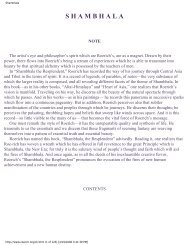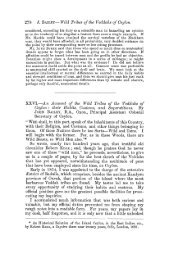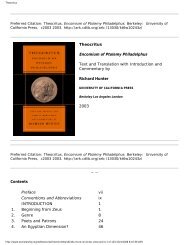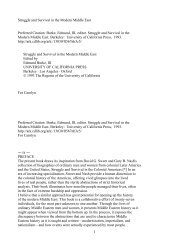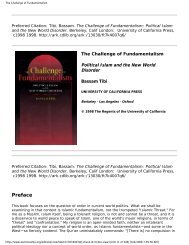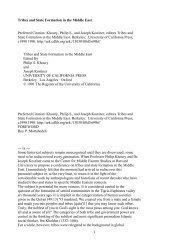Between Two Worlds Kafadar.pdf
Between Two Worlds Kafadar.pdf
Between Two Worlds Kafadar.pdf
Create successful ePaper yourself
Turn your PDF publications into a flip-book with our unique Google optimized e-Paper software.
eflected in the 1337 inscription is due to the Muslim scholars who "began to<br />
gather in the Ottoman domains" in the reign of Orhan . "In the earliest days the<br />
most visible representatives of Islam were dervishes, but soon thereafter more<br />
orthodox figures emigrated from the east in order to serve, and be served by,<br />
the Ottomans ... to the secure revenues accruing from the settled administration<br />
of the Ottoman future they added the gift of an orthodox heroic past.... The<br />
gaza became a useful convention for interpreting, to orthodox and sedentary<br />
audiences, the formative years of the dynasty."[135] No doubt an influx of<br />
Muslim schoolmen to Ottoman domains occurred during the rule of Orhan , or even<br />
as early as that of Osman, as the<br />
― 110 ―<br />
traditions concerning the conquest of Karacahisar imply. However, no sources<br />
link these schoolmen specifically to the gaza ideology, though undoubtedly they<br />
were well aware of the concept and upheld their own version of it.<br />
On the contrary, one exceptionally poignant line of criticism encountered in<br />
early Ottoman chronicles representing the gazi point of view is the one raised<br />
against the danismends (schoolmen) and the ulema who came to the Ottoman domains<br />
from the cultural centers. These sources accuse such groups of introducing many<br />
novelties and leading the rulers astray from their original path. The tenor of<br />
this criticism is nowhere as sharp as in the anonymous chronicles and, to a<br />
lesser extent, in Apz's text, namely, in the sources that can be the most<br />
closely associated with the gazi-dervish milieu. If the Muslim schoolmen coming<br />
from the east were the innovators and propagators of the gaza ideology, why are<br />
the books reflecting that gaza ideology vehemently critical of them? The truth<br />
of the matter is that the more orthodox figures who emigrated from the east were<br />
rivals of the dervishes, who were "the most visible representatives of Islam"<br />
and of the struggle for the faith, as these were understood in the early years<br />
of the Ottomans. Furthermore, it would be unfair to another, often neglected,<br />
social group to restrict the representatives of religious life in early Ottoman<br />
history to the dervishes. Looking at fifteenth- and sixteenth-century land<br />
surveys conducted in the areas of early Ottoman conquests, which meticulously<br />
record the grants and endowments made by the previous generations, it is dear<br />
that a large group of fakihs , apparently not as sophisticated as the ulema in<br />
terms of their educational background and administrative expertise, enjoyed the<br />
support of early Ottoman chiefs and warriors in return for religio-juridical<br />
services.[136] This group, too, would obviously have much to lose with the<br />
ascendancy of the medrese-trained scholar-bureaucrats, the ulema.<br />
The ties of the dervishes to the gazi milieu are attested to in the<br />
hagiographies and the gazi lore analyzed above; copious evidence of the ties of<br />
both dervishes (naturally, of some orders) and fakihs to the early Ottoman<br />
chiefs and warriors can be found in the land surveys. No wonder that the most<br />
lively and sympathetic accounts of early Ottoman gaza traditions were maintained<br />
among the later representatives of these milieux. The anonymous chronicles and<br />
the YF-Apz narrative are imbued with a nostalgia for those early years when<br />
their ruler, as these sources would have it, had not yet been seduced by the<br />
ulema and the courtiers into adopting the habits of sedentary, bureaucratic<br />
98




